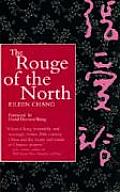
| Publisher: | University of California |
| Copyright: | 1967 |
| Printing: | 1998 |
| ISBN: | 0-520-21087-5 |
| Format: | Trade paperback |
| Pages: | 215 |
The previous book by Eileen Chang I read, The Rice Sprout Song, was sponsored by the US government as propaganda against the Chinese Communist regime. That meant that it wasn't exactly just Chang's work (and indeed the foreward here by David Der-wei Wang mentions that Chang was annoyed by how much politics she had to put into the book). The Rouge of the North was written a decade later and without that same sponsorship, so it's in that sense more true to Chang's creative vision.
Yindi is a young woman who works in her brother's sesame oil store in Shanghai. Her parents are dead, which means responsibility for her (including seeing her married and given a dowry) falls to her brother. They don't have a great deal of money, and her most likely marriage is to an assistant shop-keeper at a neighboring store, someone who is likely to never rise further. But then a matchmaker aunt finds that the wealthy Yao family is in search of someone to marry the second son of the family, an apparent opportunity to move into a considerably better situation. Yindi goes through with the marriage (a maddeningly indirect negotiation that's common for almost all interactions in this novel), finding that her new husband (as somewhat guessed in advance) is a mostly blind cripple and an opium addict. The Rouge of the North is the story of that marriage and Yindi's rise to an eventual position as a matriarch of her own household.
Politics is indeed much less of a concern here. The Rouge of the North starts at the end of the Qing dynasty in China and continues into subsequent political turmoil, but these events are mentioned only indirectly or in glancing comments except where it creates significant difficulty in obtaining income from remote land in the north. Some of the reason for this is that the politics has a hard time penetrating the cloistered sphere of interaction of a woman married into a wealthy family and surrounded by the concerns of that family, apparently rarely leaving the house. Some is that Chang writes in understatement and subtle shading, filling the book with characters who tend to leave most things unsaid.
The most fascinating aspect of this book to me is the remarkable sense of claustrophobia and isolation that it generates, and the commentary that provides on a woman's life. It's a very depressing novel in many ways, with a protagonist who becomes increasingly unlikeable over the course of the book. But it's tightly, closely observed, shaped with well-chosen sparse detail, and succeeds brilliantly at creating a sense of inevitability and restricted choice. Yindi rarely seems to have choices or alternatives: her life ordered and largely dictated by her brother and then by her mother-in-law and the wife of her husband's older brother. In those few chances she has to act on personal desire or opinion, she has little opportunity to know what she wants. By the end of the book, I had the strong sense of her having been shaped into the one course she had in her life to obtain some sense of power and self-determination. It's not a pretty choice, but it's at least one that gives her a measure of control. (But that control is simultaneously undermined by its restriction to one of the scant options she had available.)
Her persistent isolation is significantly increased by the inability of nearly anyone in this book to speak openly. Almost all conversations are held through symbols and implication, with the openly spoken words apparently unrelated or even contradictory to the unspoken message beneath. Chang guides the reader through this with admirable deftness, letting one appreciate the conversations on both levels without prior knowledge of the symbols and implications that are in play. I find this communication style deeply frustrating and abhorrent, but it's beautifully shown in all of its implications and I found it completely believable. And it creates remarkable barriers between everyone in the story. Even if they wanted to break out of their restricted roles and the web of social expectation and obligation, the enforced elliptical communication style offers very few opportunities to do so, rendering many things effectively unsayable. And Chang effectively conveys the ever-present sense of danger at violating social norms or offending someone with the power to make one's life miserable.
Even more than The Rice Sprout Song, this is fiction at its most realistic and mimetic. It is a tightly observed story about one woman's life, presented almost without comment, left for the reader to make of it what they will. There isn't even the glimmer of heroism that The Rice Sprout Song's engagement with politics offers. This isn't the sort of fiction that I turn to by preference, and I'm unlikely to read more of Chang's work. But I'm glad I read this one because it's an excellent example of the craft. It's also short, well-paced, and doesn't founder on excessive detail, which is sometimes a problem in efforts at descriptive realism.
Recommended if this is your sort of thing and you don't mind a depressing, quiet tragedy. And even if not, it's an interesting (and brief) example of how this sort of book works when done well.
Reviewed: 2011-10-07